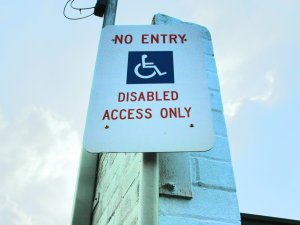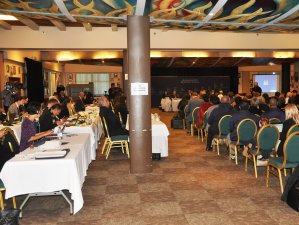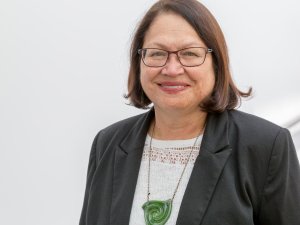Respiratory physician Lutz Beckert considers chronic obstructive pulmonary disease management, including the prevention of COPD, the importance of smoking cessation and pulmonary rehabilitation, and the lifesaving potential of addressing treatable traits. He also discusses the logic of inhaler therapy, moving from single therapy to dual and triple therapy when indicated, as well as other aspects of management
A day for tāngata whaikaha Māori: Papakura Marae occasion a landmark in disability issues
A day for tāngata whaikaha Māori: Papakura Marae occasion a landmark in disability issues

It was a privilege to hear evidence of how tāngata whaikaha Māori (Māori with lived experience of disability) have fared in the health system, writes Gabrielle Baker
The Waitangi Tribunal primary care report has been highly (and unprecedently) influential on government policy
Papakura Marae served as the first in-person hearing since the Waitangi Tribunal began its inquiry into claims concerning Māori with lived experience of disability.
This, as well as manaakitanga from the haukainga, made it feel like a landmark occasion. Added to that, the significance of the evidence presented by claimants and expert researchers made the session a privilege to attend.
It was the fifth hearing week of this inquiry, part of the Health Services and Outcomes Kaupapa Inquiry (known to many of us as Wai 2575).
In 2015, when the tribunal first set up its approach to kaupapa inquiries (thematic inquiries into nationally significant issues), “health” probably seemed like a discrete enough theme. But at one judicial conference with claimants six years ago, the tribunal realised it needed to break Wai 2575 into several stages or risk never finishing its inquiry.
The first stage focused on primary healthcare and the submissions of three sets of claimants: Hakopa Paul and Taitimu Maipi; Janice Kuka and Lady Tureiti Moxon; and the National Hauora Coalition.
The resulting tribunal report has been highly (and unprecedentedly) influential on government policy. The report identified five principles of Te Tiriti o Waitangi it said applied to primary healthcare (rangatiratanga, equity, active protection, options and partnership), and several Crown breaches of these principles.
Solutions recommended by the tribunal included legislative change, stronger accountability for performance, calculating (and compensating for) underfunding of Māori health providers and PHOs, and the establishment of a Māori health authority. In some way, most of these recommendations have been acted on. Debate continues on the adequacy of some of the responses.
Against this background, hopes are high that the Crown and the tribunal will bring the same energy for change into the second stage of the inquiry.
Week five was a chance for four different claimant groups to give their evidence. Most of this focused on the lived experiences of tāngata whaikaha Māori (Māori with lived experience of disability), starting with evidence from tāngata turi (the Māori deaf community).
Māori are overrepresented within the deaf community, which is linked to inequities in health outcomes (such as worse outcomes from illnesses such as measles, meningitis and rubella, which can lead to hearing loss).
The evidence presented by tāngata turi highlighted the issues of historical and contemporary inequities.
Tāngata turi have the lowest rates of PHO enrolment and some of the highest rates of mental health contact and emergency department presentations, according to “Kei Aaku Ringa” – Te Mana Motuhake o Ngaati Turi.
This is an independent report commissioned for the tāngata turi claim (Wai 2143) and authored by Kirsten Smiler and others.
The report looks at the impacts of compulsory institutionalisation, which took hearing-impaired children from their families supposedly for education. Also described was the denial of language experienced by tāngata turi, especially at schools where sign language was forbidden and lip reading and speaking were the permitted methods of communication. This denial continues with the critical shortage of trilingual interpreters (competent in New Zealand Sign Language, English and te reo Māori). The tribunal heard there are only three fully qualified trilingual interpreters in Aotearoa, which creates unfair barriers to tāngata turi accessing te ao Māori.
READ MORE:
- OPINION: Shining a light on disability and Māori - The next stage of the Kaupapa Inquiry into Health Services and Outcomes
- NEWS: Waitangi Tribunal tells Government get real on funding
- NEWS: ‘Māori providers should be getting $1 billion a year’
- NEWS: Talk is fine but primary care Treaty claimants want a commitment for change
The National Hauora Coalition, led by chief executive Rachel Brown, gave evidence in week five. Although the evidence touched on issues for primary healthcare, including the lack of appropriate funding, monitoring and contracting, the focus was expert tāngata whaikaha Māori evidence on how ableism and racism intersect in ways that are counter to the guarantees in Te Tiriti o Waitangi and international human rights instruments. This translates to a lack of quality data about tāngata whaikaha Māori, which limits the Crown’s ability to plan appropriate services, undertake effective quality improvement, and hold contracted services and itself to account for its performance for tāngata whaikaha Māori.
There are at least three more weeks of claimant evidence before the Crown provides its evidence and response. This means that a report from the tribunal is unlikely before 2025. But the urgency of the evidence from week five, and the weeks before it, mean that it would be unconscionable for the Ministry of Health and the other health agencies to wait for tribunal findings before acting.
In the case of tāngata turi evidence, there have been repeated calls for government agencies to invest in increasing the number and skills of interpreters. This is work that could start immediately.
Evidence across all claimant groups so far has highlighted the lack of tāngata whaikaha Māori voice in government decision-making. For It was a privilege to hear evidence of how tāngata whaikaha Māori (Māori with lived experience of disability) have fared in the health system, writes Gabrielle Baker example, there are no requirements to have tāngata whaikaha Māori at health sector board tables.
Addressing this, by seeking out and building tāngata whaikaha Māori governance skills and appointing tāngata whaikaha Māori to board positions, is within the grasp of officials and ministers with no need to wait for a report!
The next hearing week is in June, venue to be confirmed. Like the five weeks before it, I expect it will be an exceptional week of tāngata whaikaha Māori-led evidence. And I can’t wait.
Gabrielle Baker (Ngāpuhi, Ngāti Kuri) is an independent health policy consultant
We're publishing this article as a FREE READ so it is FREE to read and EASY to share more widely. Please support us and the hard work of our journalists by clicking here and subscribing to our publication and website







![Barbara Fountain, editor of New Zealand Doctor Rata Aotearoa, and Paul Hutchison, GP and senior medical clinician at Tāmaki Health [Image: Simon Maude]](/sites/default/files/styles/thumbnail_cropped_100/public/2025-03/Barbara%20Fountain%2C%20editor%20of%20New%20Zealand%20Doctor%20Rata%20Aotearoa%2C%20and%20Paul%20Hutchison%2C%20GP%20and%20senior%20medical%20clinician%20at%20T%C4%81maki%20Health%20CR%20Simon%20Maude.jpg?itok=-HbQ1EYA)
![Lori Peters, NP and advanced health improvement practitioner at Mahitahi Hauora, and Jasper Nacilla, NP at The Terrace Medical Centre in Wellington [Image: Simon Maude]](/sites/default/files/styles/thumbnail_cropped_100/public/2025-03/2.%20Lori%20Peters%2C%20NP%20and%20advanced%20HIP%20at%20Mahitahi%20Hauora%2C%20and%20Jasper%20Nacilla%2C%20NP%20at%20The%20Terrace%20Medical%20Centre%20in%20Wellington%20CR%20Simon%20Maude.jpg?itok=sUfbsSF1)
![Ministry of Social Development health and disability coordinator Liz Williams, regional health advisors Mary Mojel and Larah Takarangi, and health and disability coordinators Rebecca Staunton and Myint Than Htut [Image: Simon Maude]](/sites/default/files/styles/thumbnail_cropped_100/public/2025-03/3.%20Ministry%20of%20Social%20Development%27s%20Liz%20Williams%2C%20Mary%20Mojel%2C%20Larah%20Takarangi%2C%20Rebecca%20Staunton%20and%20Myint%20Than%20Htut%20CR%20Simon%20Maude.jpg?itok=9ceOujzC)
![Locum GP Helen Fisher, with Te Kuiti Medical Centre NP Bridget Woodney [Image: Simon Maude]](/sites/default/files/styles/thumbnail_cropped_100/public/2025-03/4.%20Locum%20GP%20Helen%20Fisher%2C%20with%20Te%20Kuiti%20Medical%20Centre%20NP%20Bridget%20Woodney%20CR%20Simon%20Maude.jpg?itok=TJeODetm)
![Ruby Faulkner, GPEP2, with David Small, GPEP3 from The Doctors Greenmeadows in Napier [Image: Simon Maude]](/sites/default/files/styles/thumbnail_cropped_100/public/2025-03/5.%20Ruby%20Faulkner%2C%20GPEP2%2C%20with%20David%20Small%2C%20GPEP3%20from%20The%20Doctors%20Greenmeadows%20in%20Napier%20CR%20Simon%20Maude.jpg?itok=B0u4wsIs)
![Rochelle Langton and Libby Thomas, marketing advisors at the Medical Protection Society [Image: Simon Maude]](/sites/default/files/styles/thumbnail_cropped_100/public/2025-03/6.%20Rochelle%20Langton%20and%20Libby%20Thomas%2C%20marketing%20advisors%20at%20the%20Medical%20Protection%20Society%20CR%20Simon%20Maude.jpg?itok=r52_Cf74)
![Specialist GP Lucy Gibberd, medical advisor at MPS, and Zara Bolam, urgent-care specialist at The Nest Health Centre in Inglewood [Image: Simon Maude]](/sites/default/files/styles/thumbnail_cropped_100/public/2025-03/7.%20Specialist%20GP%20Lucy%20Gibberd%2C%20medical%20advisor%20at%20MPS%2C%20and%20Zara%20Bolam%2C%20urgent-care%20specialist%20at%20The%20Nest%20Health%20Centre%20in%20Inglewood%20CR%20Simon%20Maude.jpg?itok=z8eVoBU3)
![Olivia Blackmore and Trudee Sharp, NPs at Gore Health Centre, and Gaylene Hastie, NP at Queenstown Medical Centre [Image: Simon Maude]](/sites/default/files/styles/thumbnail_cropped_100/public/2025-03/8.%20Olivia%20Blackmore%20and%20Trudee%20Sharp%2C%20NPs%20at%20Gore%20Health%20Centre%2C%20and%20Gaylene%20Hastie%2C%20NP%20at%20Queenstown%20Medical%20Centre%20CR%20Simon%20Maude.jpg?itok=Z6u9d0XH)
![Mary Toloa, specialist GP at Porirua and Union Community Health Service in Wellington, Mara Coler, clinical pharmacist at Tū Ora Compass Health, and Bhavna Mistry, specialist GP at Porirua and Union Community Health Service [Image: Simon Maude]](/sites/default/files/styles/thumbnail_cropped_100/public/2025-03/9.%20Mary%20Toloa%2C%20Porirua%20and%20Union%20Community%20Health%20Service%20in%20Wellington%2C%20Mara%20Coler%2C%20T%C5%AB%20Ora%20Compass%20Health%2C%20and%20Bhavna%20Mistry%2C%20PUCHS%20CR%20Simon%20Maude.jpg?itok=kpChr0cc)